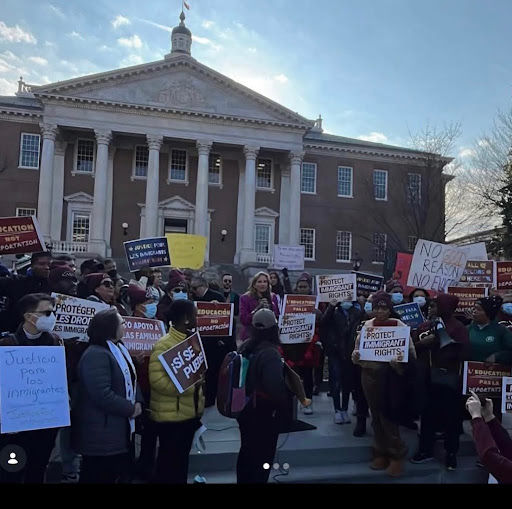Veto Overrides, RELIEF Act, and Other Legislation
- Feb 15, 2021
- 4 min read
Updated: Jan 24, 2022

Dear Friend,
Last week, after a month of legislating remotely, the House was back on the Floor! Or, rather, back on several Floors. To allow for social distancing, we spread out on the Floor of the House Chamber, the Gallery, and in the Annex. We have a video feed between the State House and the Annex to allow Delegates to speak and vote. While there are some technical glitches and parts of the work become more challenging, these changes are crucial to allow us to keep everyone healthy and continue the important work of the General Assembly.
VETO OVERRIDES
We began with a number of overrides to legislation Governor Hogan vetoed:
I could not have been more proud to vote with my colleagues in favor of the Blueprint for Maryland’s Future— transformative legislation that will ensure equity and a world class education for all Maryland students. With the additional inequitable impact of the pandemic, this investment in our children is more important now than ever.
We also overrode the Governor’s veto on rifle and shotgun transfers. This is crucial public safety legislation to ensure that such transfers are done above board and with background checks.
We also voted to fund the nation’s first Prescription Drug Affordability Board to regulate what state and local government entities pay for certain prescription drugs, over the Governor’s veto. We can and we must get these costs under control.
Our override of the bill establishing the tobacco and digital advertising tax will ensure that tech giants pay a share of their taxes to Maryland and is projected to capture at least an additional $90 million to fund education.
I was also pleased to be able to cast my vote in favor of the Pre-release Unit for Women, which will ensure gender equity in pre-release programming in our state correctional system.
Finally, we overrode the Governor’s veto of my bill that would establish a system for state agencies to purchase from local farmers and establish infrastructure for multiple local farmers to aggregate their product and sell to larger institutions.
RELIEF ACT
This week, the House of Delegates took a historic step with the bipartisan passage of the Recovery for the Economy, Livelihoods, Industries, Entrepreneurs, and Families (RELIEF) Act, which provides over $1.5 billion in pandemic relief, including utility assistance, food, health, education, and other social supports. The RELIEF Act will infuse the State’s economy with $509 million in spending and provide over $1 billion in tax relief and credits. With this bill, Maryland becomes the state with the largest earned income tax credit in the nation, which puts cash in the pockets of low-income Maryland taxpayers.
This relief package is just the first part of our efforts. Next week, we hope to pass a bill giving access to this same earned income tax credit to individuals who file with an Individual Tax Identification Number. These are tax-paying community members without social security numbers. Many of these people are immigrants, who have been hardest hit by the pandemic, and have been ineligible for other federal direct payments. The bill we expect to pass next week will get an immediate payment to people filing with an ITIN, make them eligible for similar tax rebates in the next two tax years, and lay the groundwork to make this change permanent.
UPDATES ON OTHER PENDING BILLS:
Over the last two weeks, we had hearings on the following bills I am sponsoring:
Mobile Crisis Unit: This bill will improve local governments’ ability to respond to behavioral health crises with mental health professionals, rather than law enforcement.
Heat & Eat: This program allows individuals who pay utilities through their rent, but are eligible for utility assistance, to claim a standard utility allowance on their SNAP application, thus increasing their SNAP benefits.
Energy Efficiency: This bill will increase weatherization of low-income housing–adding greater equity to the State’s energy efficiency investments and coordinating investments of health and safety funding sources. Check out this video highlighting the importance of this effort: energyefficientmaryland.org/insights/2021/2/3/empower-maryland-in-action
Accuracy in Recycling: This bill removes incineration ash from being considered a recyclable material towards a county’s recycling goal and it removes the 5% waste diversion credit for an incinerator built before 1988.
The House passed the Gas Regulator Safety/Flower Branch Act, which I wrote in response to the August 10, 2016, natural gas explosion at the Flower Branch Apartments that killed 7 people, injured 65, displaced over 100 people, and traumatized the community. The National Transportation Safety Board investigated the explosion and made several safety recommendations. This bill will require new regulators to be installed outside and requires gas companies to relocate regulators to an outside location in multi-family buildings. The bill will have a hearing in the Senate next week.
We still have eight weeks left in our legislative session. I will continue to update you on legislative activities. If you missed previous updates, you can find them on my website. As always, if you or someone you know, needs assistance, please do not hesitate to contact my office at lorig.charkoudian@house.state.md.us.
Onward,
Lorig Charkoudian




Comments